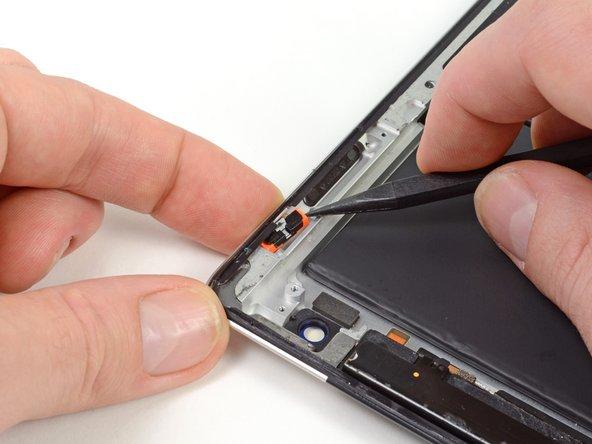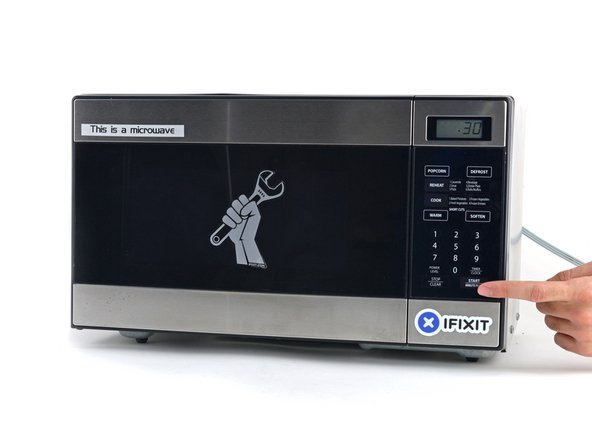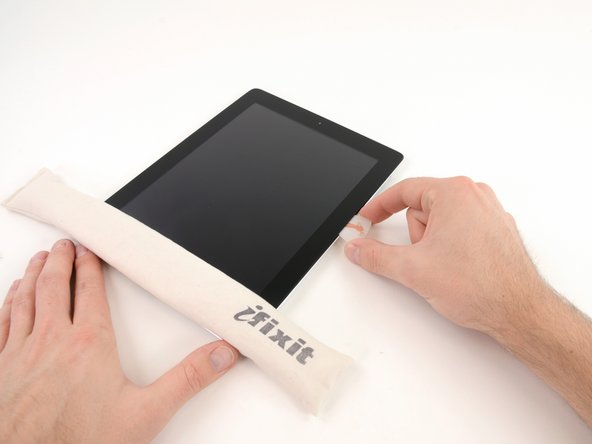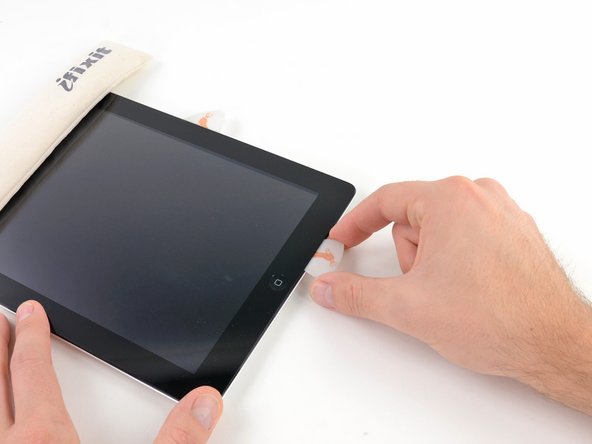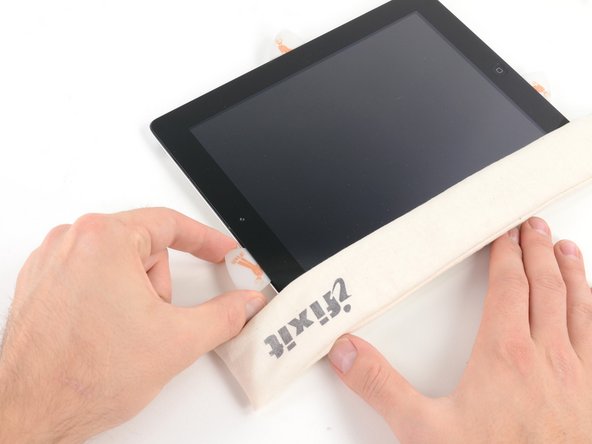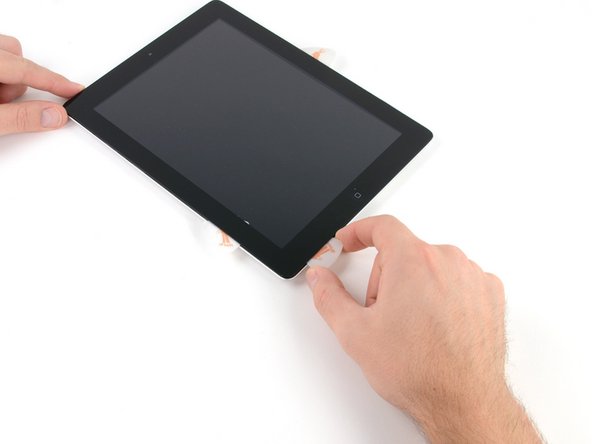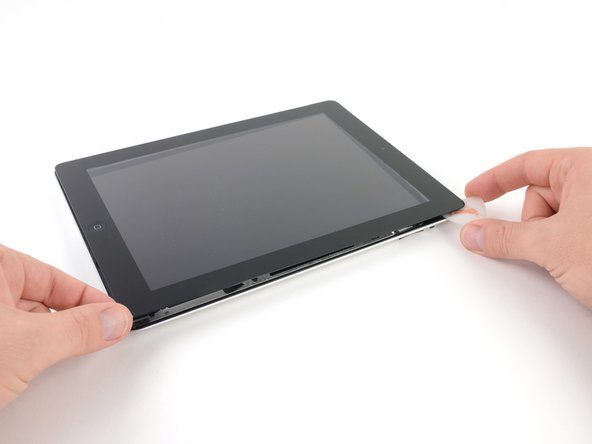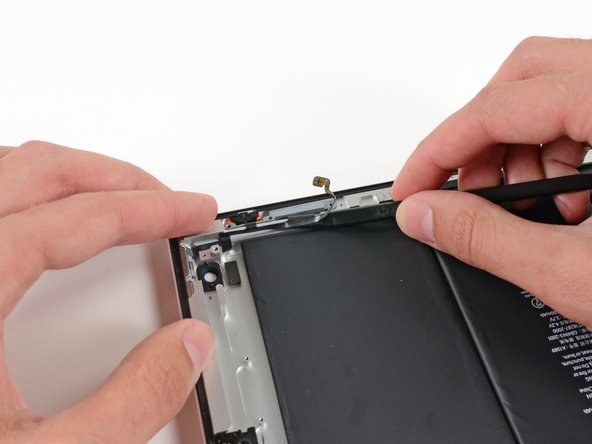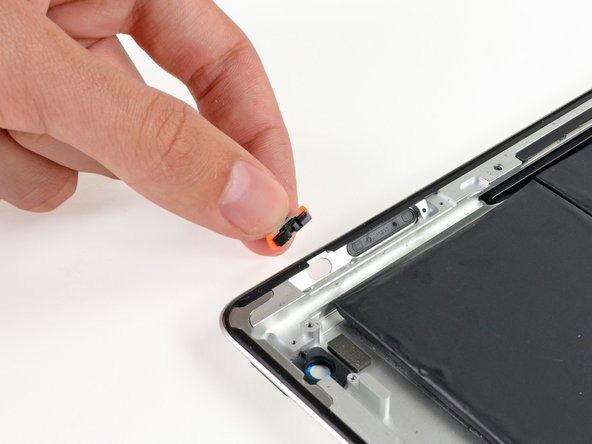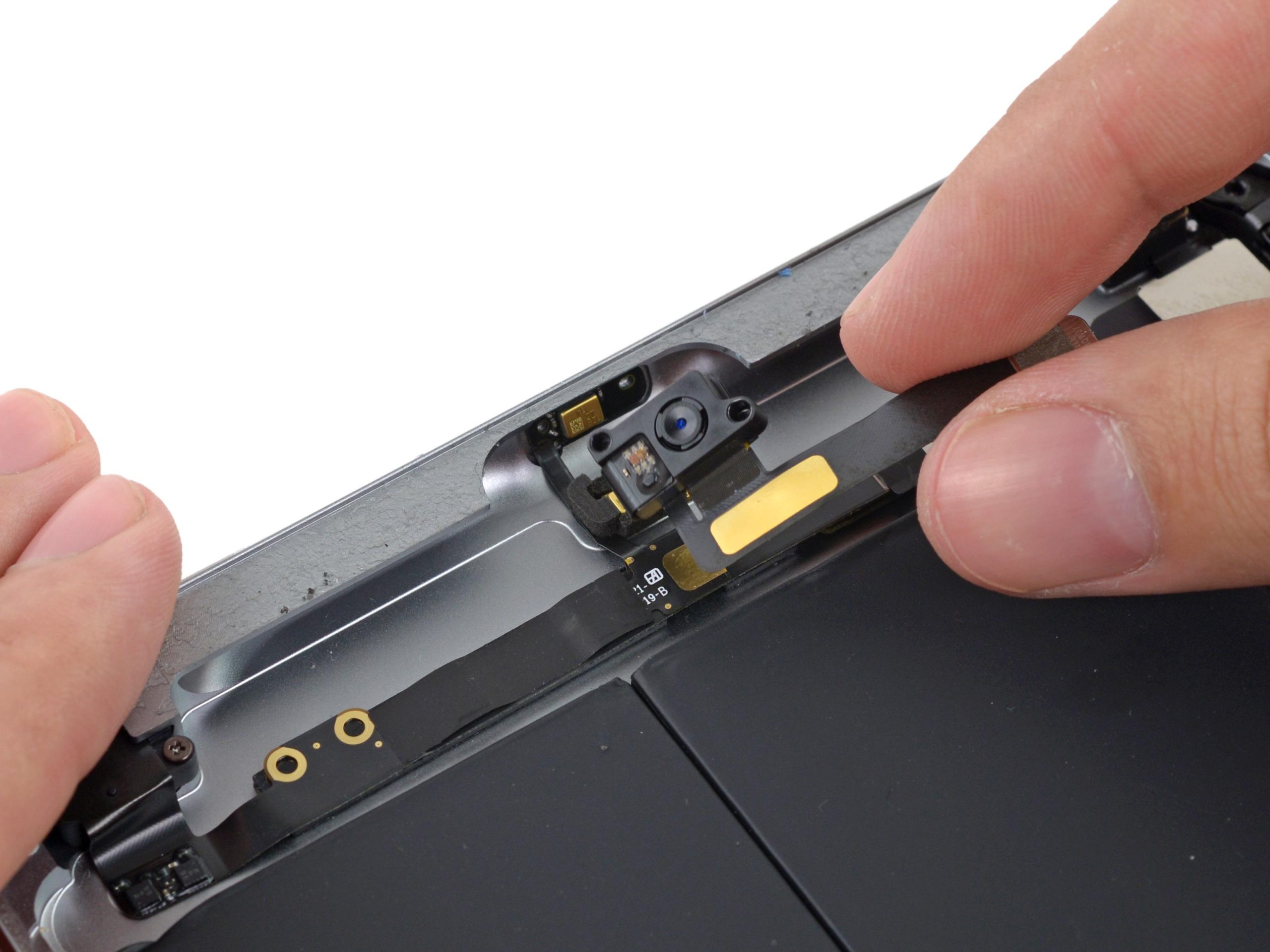DIY iPad Wi-Fi Rotation Lock Mute Switch Replacement Guide
Duration: 45 minutes
Steps: 56 Steps
Hey there, friend! Just a quick heads up: make sure you’re working in a comfy spot with good lighting. If you hit a snag or need a helping hand, don’t hesitate to schedule a repair. You’ve got this!
Get ready to tackle the rotation lock/mute switch replacement! Follow along with this guide to bring your device back to life. If you need help, you can always schedule a repair.
Step 1
Before diving in, give your microwave a little TLC. A quick clean-up will ensure that any pesky residue doesn’t stick to your iOpener during the process.
– Pop the iOpener right in the middle of the microwave and let it warm up a bit.
Tools Used
Step 2
Keep an eye on that iOpener during your repair adventure! Overheating can lead to a pop, and we don’t want that. Aim to keep it under 100˚C (212˚F).
If your iOpener looks a bit puffy, give it some space and don’t touch it.
Still feeling a bit too toasty in the middle? No worries! Just hang tight and let it cool down a bit more before you give it another heat-up. A well-heated iOpener should stay cozy for about 10 minutes.
– Give that iOpener a cozy thirty-second warm-up in the microwave.
– As you work through the repair, keep the iOpener toasty by reheating it in the microwave for another thirty seconds whenever it starts to cool down.
Tools Used
Step 3
Careful there! The iOpener is going to be super hot, so handle it with caution. An oven mitt can be your best buddy here!
– Carefully take the iOpener out of the microwave, gripping one of the flat ends to steer clear of that hot center. Safety first, friend!
Tools Used
Step 4
Don’t have a microwave? No problem! Just pop your iOpener in some boiling water to heat it up.
– Grab a pot or pan and fill it up with enough water to completely dunk that iOpener.
– Crank up the heat until the water is boiling, then turn off the heat. Safety first!
– Carefully place the iOpener in the hot water for about 2-3 minutes. Just make sure it’s totally submerged.
– Using tongs (because we want to keep those fingers safe), fish out the heated iOpener from the water.
– Give the iOpener a good towel dry to make sure it’s all set.
– And voilà! Your iOpener is primed and ready to go! If it needs a little reheat, just repeat the water boiling and soaking steps for another 2-3 minutes. If you need help, you can always schedule a repair.
Tools Used
Step 5
Put on your safety glasses to keep those peepers safe, and watch out for that LCD screen—let’s keep it in one piece!
– If your display glass has taken a hit and is cracked, let’s keep it from shattering further and avoid any potential ouchies during your repair—grab some tape and cover that glass!
– Lay down some overlapping strips of clear packing tape over your iPad’s display until it’s completely covered. Think of it as giving your device a protective hug!
– Try to stick to the rest of the guide as best as you can. Just a heads up—once the glass is broken, it might keep cracking while you work. You might want to use a metal prying tool to carefully scoop out the glass pieces. You’ve got this!
Step 6
Just a friendly reminder: as you tackle this repair, you might encounter some tricky broken glass. To keep those peepers safe from any pesky flying shards, we highly recommend rocking some safety glasses. Stay safe and stylish!
– Place the iOpener flat against the right edge of your iPad, ensuring it’s nice and snug for optimal contact with the surface.
– Give it about 90 seconds to work its magic before you try to lift the front panel.
Tools Used
Step 7
Getting that tricky wedged tip of the opening tool snug between the glass and plastic might take a bit of elbow grease. Just take your time and be gentle—wiggle that plastic tool back and forth as needed, and you’ll be on your way to a successful repair!
– Spotting a little gap in the adhesive ring of your iPad? Look up in the upper right corner, about 2.0 inches (~5 cm) from the top. It’s your secret entry point! Let’s use that to our advantage.
– Now, line up your tool with the mute button. Gently slide the tip of a plastic opening tool into that gap between the front glass and the plastic bezel. Just nudge it in a bit—enough to make the crack a tad wider. You’ve got this!
Step 9
– With the plastic opening tool snugly nestled between the front glass and plastic bezel, gently slide a plastic opening pick into that little gap right next to the tool. You’re doing great!
Step 10
– Gently take out the plastic opening tool from your iPad, and slide the opening pick a little deeper under the front glass, about half an inch. You’ve got this!
Step 12
The adhesive is super strong, so you might need to put in a bit of muscle. Just take it slow and steady!
If you catch a glimpse of the opening pick peeking out from under the front glass, give it a gentle tug. While it’s perfectly fine to use the pick at this depth, just a heads up—it might leave a bit of adhesive residue on the LCD. No biggie!
– While the iOpener warms up the bottom edge, let’s get started on freeing that pesky adhesive from the right edge of the iPad.
– Gently slide the opening pick down along the iPad’s edge, releasing the adhesive as you groove along.
Tools Used
Step 13
As you peel away the adhesive, you might need to reposition that warm iOpener back onto the right edge of the iPad. This little dance depends on how long the iPad has been cooling while you’ve been getting your repair groove on.
– If your trusty opening pick finds itself stuck in the adhesive, just give it a little roll along the side of the iPad. Keep at it, and you’ll be freeing that adhesive in no time!
Tools Used
Step 14
– Before you dive in and pluck out that first opening pick from the bottom corner of your iPad, slide a second pick under the right edge of the front glass to keep the adhesive from getting all clingy again.
– Give that iOpener a little re-heat love, then place it at the top edge of the iPad.
Tools Used
Step 15
Hey there! Just a heads up: the Wi-Fi antenna is snugly secured to the bottom right edge of the rear case of your iPad with some screws and a cable. Due to its tricky positioning, it’s super important to handle it with care—otherwise, you might accidentally cause some irreversible harm to the Wi-Fi antenna. So, take your time and be gentle!
– Alright, folks, it’s time to put on your superhero gloves because the next few steps need some serious finesse!
– You’ll be gently loosening the adhesive that holds the antenna to the front panel, and it’s super important to do this without causing any harm to the fragile parts connecting the antenna to the bottom of the iPad. So, take a deep breath and let’s dive into the next steps with care!
Step 16
Be careful not to slide the pick beyond the bottom right corner. Going too far could put a dent in your Wi-Fi antenna’s day!
– Gently glide the opening pick around the bottom right corner of your iPad to free up that stubborn adhesive!
Step 17
As you glide the opening pick along the bottom right edge of the front panel, keep in mind that the Wi-Fi antenna is lurking close to the corner. Be careful not to accidentally snip it while you’re freeing things up!
Just give that pick a little wiggle and pull it out a smidge—leave about 1/8″ (3 mm) of the tip cozy under the front glass. You’ve got this!
– Gently glide the opening pick along the bottom edge of the iPad to peel away the adhesive that’s holding the Wi-Fi antenna in place. You’re doing great!
Step 18
– Once you’ve navigated past the Wi-Fi antenna (that’s about 3 inches or 75 mm from the right edge, right by the home button), gently re-insert the opening pick all the way in.
– Now, give that pick a little slide to the right, and watch as it releases the adhesive that’s been holding the Wi-Fi antenna snugly against the front glass.
Step 19
Keep the iOpener’s heating session to a minute max, and give it a cool-down break of at least two minutes before you heat it up again. Safety first, but we know you’ve got this!
– Keep on peeling away that adhesive at the bottom of your iPad! Gently tug on that opening pick until it wraps around the home button, then slide it back in just a half-inch (10 mm) deep once you’re past that button. You’re doing great!
Tools Used
Step 20
– Keep peeling away the adhesive along the bottom edge of the iPad—you’re almost there!
– Make sure to keep the opening pick snugly in place beneath the front glass close to the home button.
Step 22
If your adhesive has decided to take a little too much time to cool, simply swap in a fresh iOpener along the top edge and keep going strong. And hey, if your iOpener is feeling a bit too chilly, just give it a quick reheat and it’ll be back to work in no time!
– Gently glide that opening pick along the top edge of your iPad, giving it a little tug to navigate around the front-facing camera bracket.
– This area has some super sticky adhesive, so don’t be surprised if you need to put in a bit of elbow grease. Take your time and stay focused—no one wants a slip-up that could cause a mishap with your iPad!
– If your pick feels like it’s glued in place, try giving it a little ‘roll’ as demonstrated in step 9.
Tools Used
Step 23
If the adhesive is feeling nice and toasty, go ahead and take the iOpener off the iPad to make your life easier. But if it’s still a bit clingy, give the iOpener another warm-up and rest it on the left edge while you get to work. You’ve got this!
– Keep peeling away that sticky adhesive at the top of your iPad, and gently maneuver the opening pick around the top left corner like a pro.
Tools Used
Step 24
The digitizer cable is hanging out about 2 inches (50 mm) from the bottom of your iPad. When you’re about 2.25 inches (60 mm) away from the bottom, it’s time to put that pick down and move on to the next step!
– Gently glide the opening pick along the left edge of your iPad, letting it work its magic on the adhesive as you go! The adhesive here is pretty thin thanks to the digitizer running along the whole left side. Just keep it light—don’t push the pick in too deep (no more than 1/2 inch or 10 mm) to keep that digitizer safe and sound.
Step 25
Be super careful! The digitizer cable is just about 1 inch (25 mm) from the bottom of the iPad. Take your time and work gently to avoid cutting this cable. You’ve got this!
– With the opening pick still tucked under the bottom edge of your iPad, gently peel back the adhesive at the bottom left corner. You’re almost there!
Step 26
– Take one of those handy opening picks and gently lift up the bottom right corner of your iPad. Then, give it a little grip with your fingers to hold it in place!
Step 27
Watch out for any stubborn adhesive still hanging around! Grab an opening pick and gently slice through any sticky bits that are keeping the front panel in place.
– Grab your iPad by the top and bottom right corners, and gently twist that front glass away like you’re opening a treasure chest!
– When it’s time to put everything back together, don’t forget to give that LCD a little TLC with a microfiber cloth and a blast of compressed air to banish any dust bunnies or fingerprints before you seal it up.
Step 28
– Time to get your toolkit ready! Start by taking out those four 2 mm Phillips #00 screws that are holding the LCD snugly against the aluminum frame. You’ve got this!
Step 29
– Grab your trusty plastic opening tool or spudger and gently pry up the right edge of the LCD from the iPad. You’re doing great!
– Now, swing that LCD around on its left edge and let it rest comfortably on top of the front panel. Almost there!
Tools Used
Step 30
– Grab your trusty spudger and gently lift that pesky piece of tape off the LCD ribbon cable connector. You’re on the right track!
Tools Used
Step 31
– Gently lift the little retaining flap on the LCD ribbon cable ZIF connector.
– With a bit of finesse, use your fingers or some tweezers to pull the LCD ribbon cable out of its cozy spot on the logic board.
Step 32
– Gently lift the LCD away from the front panel without making any contact with its surface. You’ve got this!
Step 33
If needed, gently lift the tape holding the digitizer ribbon cable in place on the logic board. You’ve got this!
– Gently lift the retaining flap on both of the digitizer ribbon cable ZIF connectors, like a friendly wave to your device’s insides!
Step 34
– Grab your trusty spudger and gently wiggle the flat end underneath the digitizer ribbon cable to break that stubborn adhesive loose.
– Now, with the utmost care, gently pull the digitizer ribbon cable straight out of its cozy sockets on the logic board. You’ve got this!
Tools Used
Step 35
– Gently lift the digitizer ribbon cable and grab a spudger to carefully break the adhesive that’s holding the cable to the back aluminum case. You’ve got this!
Tools Used
Step 36
– With a gentle tug from your fingers, coax the digitizer ribbon cable out of its snug little home in the aluminum frame.
– Carefully lift away the front panel from the iPad.
Step 37
– Gently peel away the electrical tape that’s been keeping the headphone jack assembly cable connector cozy. It’s time for it to see the light of day!
– Grab your trusty spudger and use the tip to flip up the retaining flap on both of the ZIF connectors that are holding the headphone jack cable to the logic board. You’re doing great!
Tools Used
Step 38
– Gently slide the flat end of a spudger under the headphone jack assembly cable, freeing it from the sticky grip of the rear aluminum frame.
– Carefully pull the headphone jack assembly cable straight out from its cozy home on the logic board.
Tools Used
Step 39
– Gently peel back that adhesive tape hiding the headphone jack assembly and wave goodbye to it!
Step 40
– Grab your trusty spudger and gently wiggle the flat end under the front-facing camera connector. With a little finesse, pop it off its cozy socket on the headphone jack assembly.
– Now, glide that spudger to the right like a smooth operator, freeing the adhesive that’s been keeping the camera cable all snug and secure.
Tools Used
Step 42
– Gently slide the spudger’s tip underneath the microphone ribbon cable to free it from the ZIF connector. You’ve got this!
– Now, glide the spudger to the left and let go of that adhesive keeping the microphone ribbon cable snug against the headphone jack assembly. Easy peasy!
Tools Used
Step 43
– Gently lift the little retaining flap that’s holding the volume/power button ribbon cable in place, giving it a cozy home on the headphone jack assembly board.
– Carefully slide out the volume button ribbon cable from its ZIF connector like you’re unveiling a surprise!
Step 45
– Carefully lift the headphone jack assembly ribbon cable away from the cozy foam pad nestled in the top left corner of the rear case. It’s like giving it a little hug!
– If the adhesive is feeling a bit clingy, grab the flat end of a spudger and gently coax it loose from the foam. A little encouragement goes a long way!
Tools Used
Step 46
– With both hands, gently grasp the headphone jack assembly and carefully pull it away from the iPad, keeping an eye out for any cables that might want to tag along.
Step 47
– Unscrew those little guys holding the power & volume button cable snug against the aluminum frame!
Step 48
– Go ahead and peel off that piece of plastic that’s hiding the volume buttons. You’ve got this!
Step 49
– Unscrew the lone 2.6 mm Phillips #00 screw that’s keeping the volume button frame snug against the aluminum frame. You’re on the right track!
Step 50
– Gently slide the edge of a plastic opening tool under the sleep/wake sensor, taking care not to mess up that delicate cable.
– Carefully glide the plastic opening tool around the sensor to release the sticky stuff holding it in place.
Step 51
– Keep on sliding that trusty plastic opening tool under the power and volume cables to loosen up the adhesive. You’re doing great!
Step 52
– With the spudger’s tip in hand, gently free the adhesive holding down the volume button section of that ribbon cable. You’ve got this!
Tools Used
Step 54
– With the spudger tip still tucked under that ribbon cable, gently coax the power button out of its cozy spot in the aluminum frame.
Tools Used
Step 55
– With both hands ready for action, gently tug on the power & volume button cable to pop those volume buttons and lock switch out of their cozy spots in the aluminum frame.
– Now, go ahead and lift that power & volume button cable right out of the rear aluminum case like a pro!
